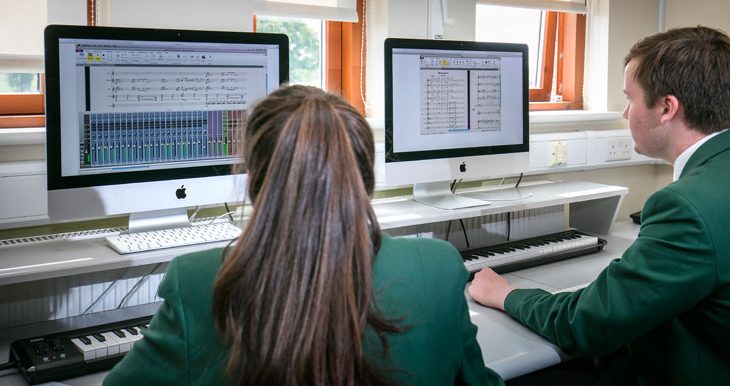

Today, computer skills are an integral part of modern society. From the cell phone alarm that wakes you, to the tablets used to chat with friends and complete homework we are surrounded by computer technology. ICT/Computing allows pupils to discover how computer technology works, to take a look at what goes on “behind the scenes” and to program. ICT/Computing also develops imaginative, innovative thinking, creativity & independence.
The key aims of the department are to:
– Develop and stimulate pupils’ curiosity, interest and enjoyment in the study of ICT & Computing
– Ensure all students have access to a broad and balanced ICT/ Computing curriculum
– Develop pupils’ knowledge, understanding and capabilities in a range of ICT/Computing skills
– Allow students to develop skills that will enhance and support study in other curriculum areas and which can be useful in everyday life
– Encourage students to recognise the value and responsible use of ICT/Computing in society
– Encourage students to develop an understanding of the wider applications and effects of ICT and Computing
– Encourage students to solve problems through the use of information systems and associated principles and techniques
– Encourage a dynamic relationship between our school, pupils and parents, to develop a positive attitude to technology both at home and school
– Provide a safe and secure learning environment which is both stimulating and challenging for all learners
Key Stage 3 Computer Science
At KS3 Computer Science is taught as a discrete subject. Students have 1 lesson per week in Year 7 & 8 and 2 lessons per week in Year 9. Schemes of work cover a range of topics that will develop students’ ability to use their ICT & Computing skills in a variety of different contexts to solve problems.
The curriculum will cover 3 key areas;
– Computer Science – involves learning about how computers work, learning textual and object-oriented programming and understanding data structures and algorithms.
– Presenting Information – using a range of software packages to present information in different formats e.g. MS PowerPoint, MS Sway, Digital Graphics
– Digital Literacy – pupils’ will be taught a range skills in software applications and they will learn how to effectively find, use, evaluate, create, and communicate information using a range of digital technologies. They will also be taught how to use technology safely and responsibly.
Key Stage 4
GCSE Computer Science
Pupils follow the OCR GCSE syllabus. In Computer Science students learn about;
– The highly creative and exciting world of computing and programming
– Coding solutions to practical problems, using programming techniques
– The fundamentals of computer science and how computers work to process data
Course Content
– Components 1 – The theory section will teach students about a wide range of issues such as hardware and software, networks and communications systems, cybersecurity
– Component 2 – fundamentals of algorithms, programming techniques, how to design, develop and test solutions to problems using a suitable programming language e.g. Python
Key Stage 5
A Level Computer Science
Pupils follow the OCR syllabus. A Level Computer Science is an exciting subject that encourages students to think creatively, logically and critically and to develop advanced problem solving skills. Students choose to study Computer Science because they are passionate about computers and want to learn about computer architecture; communications and networking; fundamentals of data representation and data structures.
Course Content
Unit 1 Computer Systems (40%)
In this unit, students learn about the components of a computer and their uses, types of software and the methodologies used to develop them.
Unit 2 Algorithms and Programming (40%)
In this unit, students learn what is meant by computational thinking, how computers and programs are used to solve problems and the use of algorithms to describe problems.
Unit 3 Programming Project (20%):
For the coursework component students analyse, design, develop, test, evaluate and document a program written in a suitable programming language.
An ICT/Computing club is available at lunch time for students to build on and enhance their ICT / Computing skills. As part of activities week Year 7 take part in activities in which they program drones and robots to perform a variety of tasks.
In addition to this, the department gives opportunities for pupils to take part in a range of competitions e.g. CyberSecurity, CyberFirst, Brebras Computational Thinking Challenges
The department have 3 ICT suites – ICT 1, ICT 2, ICT 3. All rooms come equipped with interactive boards and laser printer/scanner/copiers.